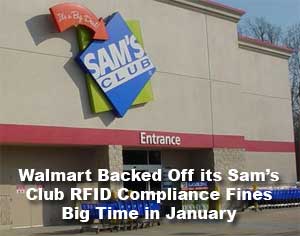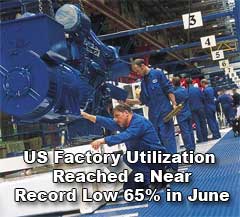![]() |
| |
![]() |
 |
![]() |
 |
|
| |
|
|
| |
 |
|
| |
|
|
| |
 Supply Chain Trends and Issues: Our Weekly Feature Article on Important Trends and Developments in Supply Chain Strategy, Research, Best Practices, Technology and Other Supply Chain and Logistics Issues Supply Chain Trends and Issues: Our Weekly Feature Article on Important Trends and Developments in Supply Chain Strategy, Research, Best Practices, Technology and Other Supply Chain and Logistics Issues |
|
| |
|
|
 |
|
| |
|
|
| |
by SCDigest Editorial Staff |
|
| |
|
|
| |
Last week, SCDigest editor Dan Gilmore gave his annual review and comment on the year in Supply Chain (see The Year in Supply Chain 2009). Below, we provide a monthly chronology of key supply chain and logistics-related news.
Take a look to refresh your memory of the year’s biggest stories.
January
It was actually the last week of December, 2008, but Dell announced – surprisingly – that Michael Cannon was out as head of Dell’s supply chain. Cannon was the first “Chief Supply Chain Officer” at Dell, and had championed an approach that largely unwound Dell’s legendary build-to-order supply chain, closed Dell’s legendary Austin manufacturing center, and used a lot more contract manufacturers. It is not clear why Cannon was removed.
The bi-annual ProMat materials handling industry show was held in Chicago. SCDigest was impressed by the number of new automated case picking solutions and the focus by conveyor system companies on “motor-driven roller” (MDR)-based systems (the rollers are powered by motors housed within some of the rollers, rather than a belt below.)
The RFID World trade show and conference announced it was broadening its focus beyond RFID, after poor attendance and exhibitor presence at the 2008 show. Event now to be called “RFI Edge,” and include many wireless technologies, nit just RFID.
Walmart dramatically scales back plans and penalties for RFID at its Sam’s Club chain, announcing there would only be a 12-cent penalty for not tagging a pallet (basically, what it would cost Walmart to tag the pallet itself), versus previously announced fines of $2-3.00 per pallet. This makes it attractive for most suppliers to just let Walmart do it.
DHL ends it US parcel operations, though it continues to serve US shippers internationally.
Pundits everywhere are offering advice on “supply chain strategies for tough times,” as the new year starts on a dismal economic note.
February
Drug cartel related violence in Mexico seems to peak and is all over the news, with many questioning whether the violence will deter companies from using the country as a sourcing/offshore manufacturing site.
The price of oil drops to below $35.00 per barrel, reaching multi-year lows, but from there the prices started to climb more or less steadily for the rest of the year.
Procter & Gamble announces it is ending its “successful” pilot with Walmart for RFID tagging of promotional displays – apparently because Walmart would not act on the information to improve display execution.
IBM releases it “Supply Chain of the Future” report.
 March March
Mexico announces it is placing a tariff on a number of agricultural imports from the US over US failure to live up to its NAFTA commitments to let Mexican truckers operate in the US.
President Obama sends a videotaped message to top union officials attending an AFL-CIO meeting in Miami indicating that he would help labor pass the Employee Free Choice Act, or so-called “card check bill.”
Walgreen’s announces it is rolling out a broad RFID system to track promotional display execution it is stores – after some eight years of testing.
In a strange episode, a fire marshals group that was considering new rules for wood pallets that might have caused thousands of warehouses to have to upgrade sprinkler systems, at great expense, backs off and tables the new rules for the time being in the face of vigorous industry pressure against the change.
April
Washington state passes an RFID privacy bill, signed by the governor into law, but the law is much toned down from earlier proposals, and is unlikely to cause RFID vendors or users much in the way of problems.
May
After months of rumors, conveyor system provider Intelligrated announces it is acquiring the Nortth American operations of the much larger FKI Logistex from its British private equity owners, creating a nearly $1 billion company.
2000 workers riot rather violently at ArcelorMittal’s headquarters in Luxembourg, protesting plant closures at the world’s largest steel maker. While there are other workers protests, predictions of high levels of global labor unrest for the summer of 2009 largely do not materialize.
June
Factory utilization bottoms out in the US at just over 65% - down from the average between 1972 and 2008 of over 79% - reaching levels not seen since the Great Depression. It slowly rises for the remainder of the year to a little over 68%
The US and the European Union filed complaints with the World Trade Organization (WTO) alleging that China is blocking the export of certain raw materials to give competitive advantage to its domestic manufacturers in a handful of sectors. The materials in question include bauxite, coke, magnesium, manganese, silicon metal and zinc..
Battle between UPS and FedEx over law that would make it easier for FedEx workers to unionize heats up, with FedEx putting out a video that parodies the UPS “white board” television ads, saying (inaccurately, SCDigest believes) that UPS is looking for a federal “bail out.”
Two pending bills increasing regulation of the rail industry – including changing the rails’ anti-trust status, regulating “bottleneck pricing,” and other changes, are put on hold, apparently so that a single, more comprehensive bill can be developed by Congressional Democrats.
Annual energy review from BP finds that first time ever, energy consumption in “non-economically developed countries” surpassed that used by developed economies in 2008. It also finds the level of proven oil reserves basically was flat in 2008 versus 2007.
A 1300-page Cap and Trade bill (Waxman-Markey bill) for carbon emissions passes the US House.
(Supply Chain Trends and Issues Article - Continued Below)
|
|
|
|
| |
|
CATEGORY SPONSOR: SOFTEON |
| |
| |
|
|
|
|
July
Bo Andersson, GM’s head of supply chain, is shown the door, a move which some hope will usher in an era of more collaborative relationships with automotive suppliers.
A Wall Street Journal story says many retailers are aggressively reducing total SKU counts and focusing on fewer SKUs per category, and predicts total SKU reductions by as much as 15-20% in leading retailers over the next 203 years.
Ocean shipping rates are reported to be down as much as 80% from their peaks.
Walmart announces plans for a new “Sustainability” scorecard for its suppliers, telling them they will be required to calculate and disclose to the retailer the environmental impact of each product, which Walmart will eventually use to develop a scorecard for each vendor/product and place labels on products.
August
The Teamsters again give concessions to YRC Worldwide (Yellow Roadway), which controls 25% of the US LTL market, as the financially wobbly carrier struggles for survival. The modified agreement includes a 5 percent incremental wage reduction and an 18-month cessation of union pension fund contributions, saving YRC some $45 million per month. The union gets additional equity in the company.
Ocean carriers begin a new round of rate increases, after some modest success with hikes in July. For example, Maersk Line will raise freight rates for cargo moving from Northern Europe to the United States and Canada by $400 for a 20-foot equivalent unit, and $500 for 40-foot equivalent units and 45 foot boxes, effective September 1. Other carriers make similar moves.
The Institute for Supply Managers Purchasing Managers Index (PMI) goes into positive territory for the first time in 2009, starting a trend that remains in place through December’s numbers.
 September September
Walmart announces it is dramatically changing its approach to its ecommerce strategy, as it adds drop shipments direct from suppliers to end customers to its offering. As a result, the number of products it can sell on-line increases by some 1 million at the new “Walmart Marketplace.”
Key Senators announce a delay in the Senate version of a Cap and Trade bill, making it unlikely any action will be taken in 2009.
CSCMP holds annual conference in Chicago, with attendance down as with nearly industry every event in 2009.
In slowly escalating trade tensions, the Obama administration’s hits Chinese-made tires imported into the US with tariffs starting at 35%, after complaints from the United Steel Workers Union over “dumping.” China cries foul, threatens action on US goods.
Kraft announces plans to significantly rationalize its huge supplier base, cutting the current 70,000 suppliers in half worldwide, which it says can save the company $300 million.
October
Hanesbrands announces plans for the final closure of a legendary hosiery plant near Winston-Salem, North Carolina that once employed 4000 workers, but was down to just a few hundred now. The decline of the plant was as much a result of changing fashions as it was about lower costs for outsourcing in Asia.
GS1 EPCglobal releases new guidelines for combining electronic article surveillance (EAS) with a RFID tag for tracking; Germany’s Metro Stores Group announces it will pilot such an approach.
Bob Moffat, head of IBM’s supply chain and the point man for the company’s 10-year effort to integrate its global supply chain, is implicated in Wall Street insider trading scandal, leaves the company a few days later.
November
JDA Software – for the second time – announces plans to acquire i2 Technologies. First attempt in 2008 fell through in the financial crisis. This one likely to succeed.
December
Gartner announces plans to acquire AMR Research, combining the two largest analyst firms for the supply chain.
Still swooning YRC Worldwide announces plan to swap much of its current debt for equity, in a move to reduce crushing debt levels created from its acquisition sprees. Though it has to keep extending the deadline for acceptance, plan is eventually approved by bond holders the first week of January, greatly reducing likelihood of bankruptcy.
The UN Climate Summit is held in Copenhagen, with President Obama in attendance. Though the US announces an agreement of sorts with China and a few other countries, most view the meeting as a non-event at which little was accomplished.
Sen. John Rockefeller (D-W.Va.) finally introduces the Surface Transportation Board Reauthorization Act of 2009, which would significantly increase regulation of the rail carriers and likely remove anti-trust exemptions.
Oil moves over $80 per barrel, its high for the year.
What stories struck you as the most important in Supply Chain? Anything we missed? Let us know your thoughts at the Feedback button below.
SCDigest is Twittering!
Follow us now at https://twitter.com/scdigest |
| |
 |
 |
 |
| |
| |
![]() ![]() |
|
|
|
|
| |
|
|
 |
![]() |
 |
|
| |
|
![]() |
|
|